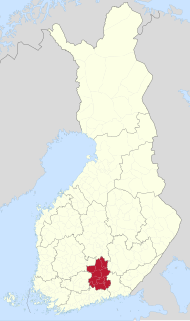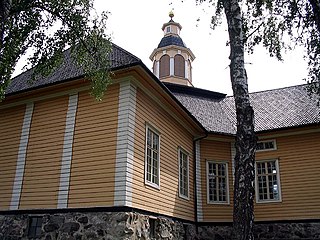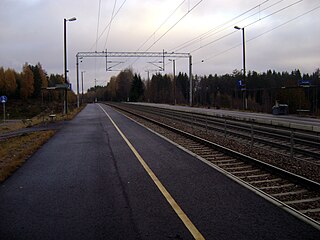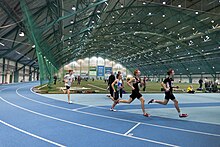
Loviisa is a municipality and town of 14,644 inhabitants on the southern coast of Finland. It is located 90 kilometres (56 mi) from Helsinki and 38 kilometres (24 mi) from Porvoo. About 43 per cent of the population is Swedish-speaking.

Lahti is a city and municipality in Finland. It is the capital of the region of Päijänne Tavastia (Päijät-Häme) and its growing region is one of the main economic hubs of Finland. Lahti is situated on a bay at the southern end of lake Vesijärvi about 100 kilometres (60 mi) north-east of the capital city Helsinki, 38 kilometres (24 mi) south-west of the Heinola town and 74 kilometres (46 mi) east of Hämeenlinna, the capital of the region of Tavastia Proper (Kanta-Häme). It is also situated at the intersection of Highway 4 and Highway 12, which are the most significant main roads of Lahti.

The Australian Institute of Sport (AIS) is a high performance sports training institution in Australia. The institute's headquarters were opened in 1981 and are situated in Canberra. The 66-hectare (163-acre) site campus is in the northern suburb of Bruce. The AIS is a division of the Australian Sports Commission; a body controlled and funded by the Australian Government.

Päijät-Häme is a region in Southern Finland south of the lake Päijänne. It borders the regions of Uusimaa, Tavastia Proper (Kanta-Häme), Pirkanmaa, Central Finland, South Savo and Kymenlaakso. The biggest city in the region is Lahti.

Nastola is a former municipality of Finland. It was merged with the city of Lahti on 1 January 2016.

St Mary's University, Twickenham is a public university in Strawberry Hill, Twickenham, in South West London committed to the mission of the Catholic Church in higher education. Originally founded in 1850, and initially a college for training Catholic schoolmasters, it became a constituent college of the University of London Institute of Education in 1949. This affiliation ended in 1976 and its degree courses were then validated by the University of Surrey. Formerly called St Mary’s University College, it was granted full university title by the Privy Council on 23 January 2014. Since July 2019, the university has hosted the Mater Ecclesiae College, whose Ecclesiastical faculties enshrined since 2013 in the "Bellarmine Institute" was brought in after the closure of Heythrop College, University of London earlier in 2019.

The University of Worcester is a public research university, based in Worcester, England. Worcester is the only university based in the counties of Worcestershire and Herefordshire. With a history dating back to 1946, the university began awarding degrees in 1997 and was granted full university status in 2005.

The Sleeman Centre is a sporting and entertainment facility located in Brisbane, Queensland, Australia. Construction of the centre was completed in 1982,Located on Old Cleveland Road in the suburb of Chandler, the centre is 15 kilometres (9.3 mi) east of Brisbane's CBD and is home to an aquatic centre, velodrome, sports arena, gymnastics training hall, gymnasium, and auditorium. The centre currently offers a range of services to the public, including indoor and outdoor community activities such as swimming, diving, health and fitness classes, a gymnasium, childcare facilities, and a children's pool and water slide.

The Nastola railway station is located in the city of Lahti in the Päijänne Tavastia region, in Finland. The station is located in the centre of the urban area of Nastola, and the distance from the Lahti railway station is 15.7 kilometres and that from the Kausala railway station is 23.6 kilometres.

Sport Wales is the national organisation responsible for developing and promoting sport and physical activity in Wales. Working alongside partners such as governing bodies of sport and local authorities, they aim to encourage sporting ambitions in the young, and promote championship standards nationally.
Most leisure centres in Cardiff, capital of Wales, are owned by Cardiff Council. Since 2016, the running of eight formerly Council-run leisure centres has been outsourced to Greenwich Leisure Limited, operating under their 'Better' branding. Channel View Leisure Centre continues to be managed by Cardiff Council, whilst the Cardiff International Pool in Cardiff Bay is run separately by another private company.

The Federal Office of Sport (FOSPO) is the Swiss federal government's centre for expertise in sports and a part of the Swiss Federal Department of Defence, Civil Protection and Sports. Its mission is to promote sports and exercise in all age groups and at all levels of ability across Switzerland, its cantons and regions. It creates optimum conditions for active participation in sports and exercise that go beyond social and cultural boundaries.
Henry Manni is a Finnish athlete and paracanoeist who has competed and medaled in both fields at World Championship level. In Paracanoeing he won a bronze medal in the K-1 200 m TA event at the 2010 ICF Canoe Sprint World Championships in Poznań. Manni later switched to athletics as a wheelchair sprinter in the T34 classification. In 2013 he won a bronze in the World Championships in the 200m event, following this with four golds in the 2014 European Championships and three further World championship medals in 2015.

Sweden women's national goalball team is the women's national team of Sweden. Goalball is a team sport designed specifically for athletes with a vision impairment. The team takes part in international goalball competitions.

Israel women's national goalball team is the women's national team of Israel. Goalball is a team sport designed specifically for athletes with a vision impairment. It takes part in international competitions.

2015 IWRF European Championship was the 10th international European wheelchair rugby competition, taken place between 15 September to 19 September. The championships was contested between Europe's eight top national teams and was held at the Pajulahti Sports Institute in Nastola, Finland. The tournament was won by Great Britain, their fifth title.

Taarasti Art Center or Taidekeskus Taarasti is a art center located in Nastola, Lahti, Finland. The center is located by the lake Pikku-Kukkanen and near the Pajulahti Sports Institute.

The Villähde railway station is located in the city of Lahti, Finland, in the district of Villähde. It is located along the Lahti–Kouvola line, and its neighboring stations are Lahti in the west and Nastola in the east.

Lithuania men's national goalball team is the men's national team of Lithuania. Goalball is a team sport designed specifically for athletes with a vision impairment. It takes part in international competitions.

The Kisakallio Sport Institute is a sport institute founded in 1949 in the village of Karnainen in the city of Lohja, Finland. Strategic main sports taught at the institute include basketball, canoeing and kayaking, rowing, rhythmic gymnastics and aesthetic group gymnastics, acting as a nationwide coaching centre for the sports.





















